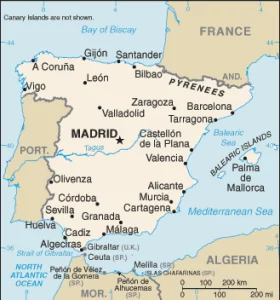Exporting to Spain


Spain Country Profile
Official Name (Local Language) Reino de Espana
Capital Madrid
Population 48,563,476
Currency Euro
GDP $1,252 billion
Languages Spanish
Telephone Dial In 34
Imports Exports Profile
Imports ($m USD) 350,922
Number of Imports Products 4,537
Number of Imports Partners 231

Spain Economic Statistics
Government Website | https://www.lamoncloa.gob.es/ |
| Sovereign Ratings | https://countryeconomy.com/ratings/spain |
| Central Bank | Banco de España |
| Currency USD Exchange Rate | 0.9214 |
| Unemployment Rate | 19.7% |
| Population below poverty line | 21.1% |
| Inflation Rate | -0.3% |
| Prime Lending Rate | 0.05% |
| GDP | $1,252 billion |
| GDP Pro Capita (PPP) | $36,500 |
| Currency Name | Euro |
| Currency Code | EUR |
| World Bank Classification | High Income |
| Competitive Industrial Performance | 32/138 |
| Corruption Perceptions Index | 42/180 |
| Ease of Doing Business | 30/190 |
| Enabling Trade Index | 15/136 |
Access trade, receivables and supply chain finance
We assist companies to access trade and receivables finance through our relationships with 270+ banks, funds and alternative finance houses.
Get StartedExporting to Spain
Imports in Spain are on the rise again after significant reforms were put in place after the GFC have begun to take effect. Dropping from $415.5 billion in 2008 to $292.3 billion in 2009, this had risen to $351 billion by 2014, up by 11.2% in four years. Tax reform, record employment growth and increased investment in research and development are all credited with assisting with the growth.
Oil is the single biggest import, reflecting 20.9% of all imports followed by vehicles at 11.2%, machines, engines and pumps at 8.5% and electronic equipment at 6.9%. Of that total, 58.4% were purchased from Europe while 19.4% came from Asia and 6.2% from North America.
Exporting to Spain: What is trade finance?
Export finance is a revolving facility which alternative financiers offer – it enables organisations to purchase stock and can help ease cashflow issues.
Typically, an alternative financier will fund most of the cost of the product, including charges (e.g. insurance costs).
Trade finance offers added advantages over more traditional bank finance for example bridging mortgages or loans. Trade finance provides up front funding without affecting existing relationships with banks.
How does it work?
If you’re a firm importing or exporting stock supplies from or to other countries, then a trade finance facility would help you to fund this through offering a letter of credit or some form of cash advance.
I’m looking to export to Spain, how can Trade Finance Global help, and how does it work?
If you’re looking to export stock supplies to other international markets, you may need finance for exporting, which is an agreement between you (the exporter), and the importer from overseas. A non-bank lender would advance you the cost of producing the goods that you are exporting (as a debt product), either once you have shipped the goods, or before manufacturing them. Once the importer has received the stock and pays you for the import, you will repay the advance from the export bank over an agreed period.
Chart Showing GDP Growth Compared to rest of world
GDP Composition for Spain
Agriculture
2.5%
Grain, vegetables, olives, wine grapes, sugar beets, citrus; beef, pork, poultry, dairy products; fish
Industry
22.4%
Textiles and apparel (including footwear), food and beverages, metals and metal manufactures, chemicals, shipbuilding, automobiles, machine tools, tourism, clay and refractory products, footwear, pharmaceuticals, medical equipment
Services
75.1%
Map
Top 5 Import Partners
| Country | Trade | % Partner Share |
| Germany | 43,896 | 12.51 |
| France | 37,616 | 10.72 |
| China | 28,960 | 8.25 |
| Italy | 22,778 | 6.49 |
| United States | 15,601 | 4.45 |
Top 5 Import Products
| Export Product | Number |
| Petroleum oils and oils obtained from bituminou | 7.3% |
| Motor vehicle parts nes | 5.7% |
| Other medicaments of mixed or unmixed products, | 4.9% |
| Automobiles with diesel engine displacing more | 2.8% |
| Petroleum oils, etc, (excl. crude); preparation | 2.3% |
Local Authors
Local Partners
- All Topics
- Spain Trade Resources
- Export Finance and ECA Topics
- Local Conferences




















